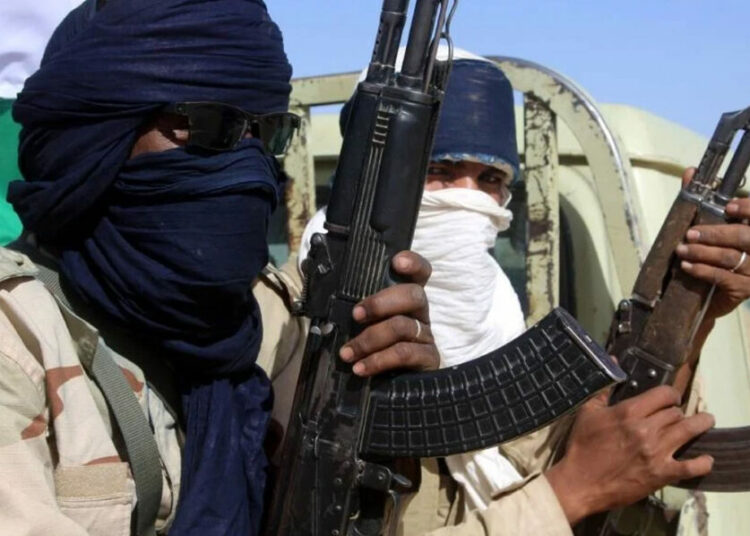The latest report from Nextier SPD on Nigeria’s deteriorating security situation reads like an indictment of a nation that has learned nothing from over a decade of battling Boko Haram insurgency.
According to the report, between November 2024 and April 2025, terrorist groups carried out 252 attacks, killing over 100 military personnel and more than 200 civilians. These are not mere statistics; they represent the lives of husbands, wives, children, and breadwinners whose deaths have plunged families into grief and communities into despair.
What makes this report particularly damning is not just the scale of the carnage, but the evidence it provides of a security strategy that has remained stubbornly unchanged despite its glaring failures.
The seizure of three local government areas in Borno State, the proliferation of improvised explosive devices (IEDs), the ambushes on military convoys, and the raids on internally displaced persons (IDP) camps all point to an insurgency that has grown more sophisticated while Nigeria’s response has remained predictably kinetic.
The January 2025 spike, which recorded 92 deaths in just eight incidents, reveals the disturbing escalation in the lethality of attacks.
In the opinion of this newspaper, this is not a sign of an insurgency in decline, but one that has adapted, evolved, and become deadlier.
The diversification of tactics to include kidnappings, with April 2025 recording eight victims, further demonstrates how criminal elements have exploited the security vacuum created by the government’s narrow military focus.
For over a decade, Nigerian authorities have persisted with a predominantly military approach to countering Boko Haram, as if the problem were merely a matter of superior firepower. This strategy has not only failed spectacularly but has, in many instances, worsened the situation.
The report’s revelation of growing fatigue within military ranks, deteriorating civil-military relations, and the erosion of community trust underscores the unsustainability of the current approach.
The fundamental flaw in Nigeria’s counterinsurgency strategy is its failure to address the root causes of extremism. Poverty, youth unemployment, and poor access to education and services continue to create fertile ground for radicalisation.
In a region where over 70 per cent of the population lives below the poverty line, where youth unemployment exceeds 50 per cent and where educational facilities are either non-existent or targets for destruction, military operations alone are like treating the symptoms while ignoring the disease.
The weak coordination among security agencies is another indictment of the system. In a battle against an enemy that moves seamlessly across borders and exploits every institutional weakness, the inability of Nigerian security forces to work in harmony is not just inefficient—it is criminal negligence.
Reports of human rights abuses by security forces have further alienated communities whose cooperation is essential for gathering intelligence and identifying insurgents.
The reintegration of former fighters, a critical component of any successful counterinsurgency strategy, has been bungled due to community resistance and insufficient preparation. Without genuine efforts to address grievances and provide alternative livelihoods, Nigeria is essentially creating a revolving door for insurgency, where today’s supposedly reformed fighter becomes tomorrow’s recruiter.
The international community has not been blind to Nigeria’s struggles. Countries like Colombia, Sri Lanka, and Indonesia have successfully countered insurgencies by combining military action with comprehensive socioeconomic interventions.
Nigeria’s refusal to learn from these examples speaks to an institutional arrogance that has cost thousands of lives.
The implications extend beyond Nigeria’s borders. The Lake Chad region, already destabilised by Boko Haram’s activities, faces further turmoil as the group’s resurgence sends ripples across Cameroon, Chad, and Niger. Nigeria’s inability to effectively tackle the insurgency at home threatens regional stability and undermines continental security architecture.
What is particularly frustrating is that the solutions are well-documented. The Nextier SPD report calls for integrating military efforts with governance reforms, inclusive dialogue, and socioeconomic revitalisation.
Similar recommendations have been made by countless experts, think tanks, and international organisations over the years. Yet, Nigerian authorities continue to pour resources into a strategy that has consistently failed to deliver lasting results.
The human cost of this policy failure cannot be overstated. Every additional day that Nigeria persists with its flawed approach means more lives lost, more communities destroyed, and more ground ceded to extremists.
In our view,what Nigeria needs is a fundamental rethinking of its approach to security, one that places communities at the centre of the solution.
This means massive investments in education, youth employment programmes, and infrastructure development in affected areas. It means reforming security agencies to ensure better coordination and accountability. It means engaging community leaders, traditional rulers, and civil society organisations as partners rather than afterthoughts in the peace process.
Nigeria must also improve regional cooperation beyond mere lip service. The joint Multinational Joint Task Force (MJTF) needs enhanced intelligence sharing, coordinated operations, and sustained political commitment from all member countries.
As Nigeria grapples with this resurgence, the international community watches with growing concern. The failure to decisively defeat Boko Haram after 15 years of insurgency raises serious questions about the country’s capacity to handle security challenges in Africa’s most populous nation.
The blood of those killed in these 252 attacks demands nothing less than a complete strategic rethink. Nigeria owes this to the fallen, to the living, and to future generations who deserve to inherit a nation at peace with itself.
We’ve got the edge. Get real-time reports, breaking scoops, and exclusive angles delivered straight to your phone. Don’t settle for stale news. Join LEADERSHIP NEWS on WhatsApp for 24/7 updates →
Join Our WhatsApp Channel










